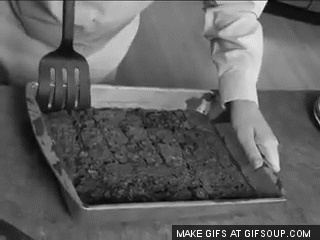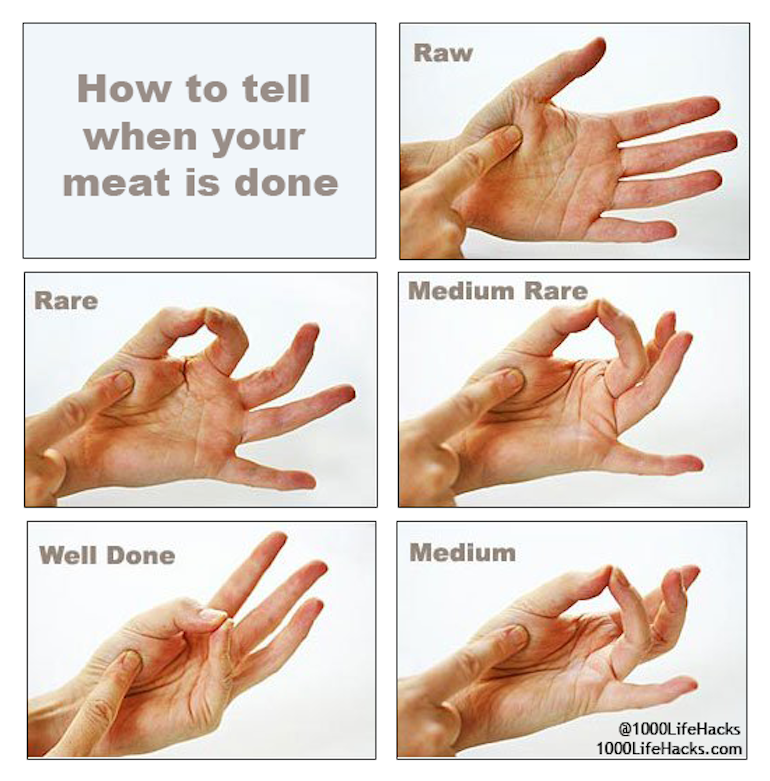There’s no doubt about it, our society is obsessed with food. And while it’s really awesome that we’re excited about what we’re eating, it also means that we’re constantly being bombarded with ads for new kitchen tools that claim to be the best thing in the world of cooking since sliced bread.

GIF courtesy of gifsoup.com
We’ve all seen those 3 am infomercials, “For just 6 easy payments of $39.95 this random gadget can be yours!” but the truth is, you don’t need any of that crap.
Seriously, the best tools in the kitchen don’t even come from the store. They’re free, and everyone already has them. Stumped yet? The best tools in the kitchen are your five senses.
Touch

GIF courtesy of tumblr.com
You’ve gotta be able to touch your food. And yes, sometimes that means peeling raw shrimp or getting all up in a turkey’s business (if ya know what I mean). Sure, spoons and spatulas will work, but in some cases, you really need your hands to get the job done gently.
#SpoonTip: Always use your hands to stir and form meatballs to ensure you get light and fluffy results. Here’s a grandma-approved recipe.
Touch is also a great way to test your food for doneness. Ever struggle to get a perfectly medium-rare steak? The solution lies in your hand. Just give your meat a little push, compare it to the firmness of your hand as per the instructions on the chart below, and never suffer through an overcooked steak again.

Photo courtesy of 1000lifehacks.com
Smell

GIF courtesy of giphy.com
If you’ve ever had to use your nose to test if the milk had gone bad, then you know what I’m talking about. Simply put — if it doesn’t smell good, then it’s probably not gonna taste good (of course, there are some exceptions, like blue cheese and fish sauce). You’d think this would be common sense, but I’ve heard horror stories about people messing up entire dishes with one spoiled ingredient. Don’t be that person.
Contrary to what you may think, fresh fish shouldn’t smell fishy. So if you smell that piece of salmon and it makes you want to hurl, toss it. It’s not worth the food poisoning.
Your nose isn’t only good for smelling when food’s gone bad, it can also tell you when things are going well. When you’re making the brown butter to top off some homemade ravioli or for these sinful Rice Krispies treats, things can go awry very quickly. Once the butter starts smelling nutty, it’s time to take it off the heat – any longer and it’ll burn.
Sight

GIF courtesy of imgur.com
Besides touch, this is probably the most important sense used in the kitchen. Need to know if the pancakes are ready to flip? Look for those little surface bubbles. Not sure if your avocado is ripe? Check out the area under the stem. Flames coming out of the oven? That’s your cue that something’s gone way wrong.
Aside from a thermometer, your vision is the best way to ensure that your poultry is properly cooked and in the salmonella-free zone. If you’re one of those people paranoid about undercooking chicken, just cut into it and take a look at the meat. If it’s opaque and the juices are running clear, then you’re good to go.
It’s important to keep sight in mind when serving food as well. Never underestimate the power of an epic garnish.
Hearing

Photo courtesy of nationalgeographic.com
It’s important to listen in the kitchen, too, and not just for the sound of the smoke alarm. For example, water at a full, roaring boil sounds a lot different than water at a mere simmer. Seriously, try it out for yourself.
Likewise, if you want to get a perfectly seared steak, you’ve got to make sure you hear that sizzle when you put in the pan. No sizzle means no browning which means no flavor.
On the other hand, sometimes it’s good to hear silence in the kitchen. For example, if you’re caramelizing onions, they’ll make a ton of noise when you first put them in the pan. However, after the moisture has escaped, they’ll stop sputtering, which means you’re well on your way to beautifully browned onions that you can use in these festive tartlets.
Taste

GIF courtesy of senorgif.com
This one’s a total no-brainer. Regardless of the recipe, you’ve got to taste your food as you go and trust your intuition. If you think it needs more salt or a squeeze of Sriracha, then go right ahead — just be sure to use a clean spoon. Nobody likes a double-dipper.
For those times when you’ve slaved over a dish for hours only to give a it try and realize that it tastes kinda meh, then add in a splash of vinegar or a squeeze of lemon juice to wake up the flavors.
So the next time you’re up at 3 am convinced that you need a Slap Chop, just remember that fresh ingredients, a few utensils, and your five senses are all you really need to cook awesome food.


